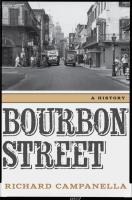New Orleans is a city of many storied streets, but only one conjures up as much unbridled passion as it does fervent hatred, simultaneously polarizing the public while drawing millions of visitors a year. A fascinating investigation into the mile-long urban space that is Bourbon Street, Richard Campanella's comprehensive cultural history spans from the street's inception during the colonial period through three tumultuous centuries, arriving at the world-famous entertainment strip of today.
Clearly written and carefully researched, Campanella's book interweaves world events--from the Louisiana Purchase to World War II to Hurricane Katrina--with local and national characters, ranging from presidents to showgirls, to explain how Bourbon Street became an intriguing and singular artifact, uniquely informative of both New Orleans's history and American society.
While offering a captivating historical-geographical panorama of Bourbon Street, Campanella also presents a contemporary microview of the area, describing the population, architecture, and local economy, and shows how Bourbon Street operates on a typical night. The fate of these few blocks in the French Quarter is played out on a larger stage, however, as the internationally recognized brands that Bourbon Street merchants and the city of New Orleans strive to promote both clash with and complement each other.
An epic narrative detailing the influence of politics, money, race, sex, organized crime, and tourism, Bourbon Street: A History ultimately demonstrates that one of the most well-known addresses in North America is more than the epicenter of Mardi Gras; it serves as a battleground for a fundamental dispute over cultural authenticity and commodification.

